The Resilience Champion
Welcome, Resilience Champions!
Greetings and welcome to The Resilience Champion Workshop Series! This series will guide you as you move from trauma-aware to trauma-informed and trauma-responsive. Your participation in each workshop to help you establish a foundation, create goals, and identify concrete steps you can take to sustain a trauma-informed and resilience-building approach in your specific setting.
Here we go!
Course Guide
Many of the answers to your questions can be found in the course guide. Please do not hesitate to contact us with any questions or concerns.
Don’t forget to share your experiences on social media throughout the course using @originstc and #resiliencechampion.
Thank you for allowing us to be a part of your journey!
Join the Discussion
People want to know you! One of the most common pieces of feedback we get is that people want to get to know and connect with others who are integrating a trauma-informed approach. We invite you to introduce yourself and share as much or as little as you’d like about your journey in this work.
The Resilience Champion
Capstone & Next Steps
In this workshop, both cohorts will come together to share experiences and learnings and to explore next steps for implementation. The focus of this final workshop is on reflecting on the process of building a resilient culture and making it a reality. In this final workshop, participants will synthesize learnings and identify concrete next steps in the resilience-building journey.
Key Takeaways:
- As we close the series, look back at previous workshops and complete any steps with your team that you may have missed or that you feel that you have better insight on now. Building a solid foundation and being flexible in the process are critical to sustainable implementation of a trauma-informed approach.
- Revisiting the foundational concepts of a trauma-informed approach including understanding stress, how we adapt, and how to build resilience can support a shared language.
- Identifying and practicing skills for communication, building safety, and regulating stress support a trauma-informed culture.
- The activities from previous workshops including developing a team, what’s your why, developing a vision statement, identifying values, assessing needs and strengths, and establishing goals can also be revisited.
- Identifying concrete steps after meetings to support the implementation of this approach by team members is a helpful tool for teams to use.
- Building buy-in is an ongoing process. Whether it’s with those who might not understand how this approach is relevant to their work, others who are feeling siloed and disconnected, or even as a reminder to yourself about how this work can make and impact, you can utilize this practice. We’ve included a tool for you to reference!
Join the Discussion
The Resilience Champion
Defining Your Goals
In this section, you’ll build off the findings of your assessment to define concrete goals for integrating a trauma-informed approach into your setting, using a strengths-based method to identify resources that can support you in your process.
Key Takeaways:
- This section focused on using the information from the assessment to help define concrete goals for your setting.
- Your goals describe specific objectives that you would like to accomplish and help translate your overall vision into concrete next steps to help achieve that vision.
- Your goals are different from the activities to meet those goals. (We will talk more about activities next week!)
- Some of the goals that you create will be short-term and some will require more time to execute.
- Considerations as you define your goals:
- First, be specific. Think about the findings from your assessment—what is your specific area for improvement?
- Second, how are you going to know if you are making progress against your goals? Measurement can be tricky when you are talking about integrating a resilience-building approach–how will you know if you are succeeding?
- Third, remember that this is a team approach. Think about your allies for this work (both within and outside of your setting) and who can help. You cannot do this alone. A strong team is essential to prioritize and problem-solve.
- Fourth, make sure your goals are realistic. Think about your setting, your sphere of influence within that setting, and create goals that you think you can achieve. Early success with smaller goals will more likely lead to buy-in from others than grand plans that sound great but don’t go anywhere. Remember the mantra…keep it simple!
Join the Discussion
The Resilience Champion
Assessing your Setting
In this section, you’ll use a systematic approach to assess and examine the different domains of your setting, such as leadership capacity, policies and procedures, and physical environment.
Key Takeaways:
- In the first three sections of the course, the focus was on setting your table for the sustainable application of a trauma-informed and resilience-building approach. In section 4, we shift to focus on assessing your setting using a trauma-informed https://originstc.wpengine.com/wp-admin/post.php?post=342&action=edit#saveassessment.
- The intent behind a trauma-informed assessment is to use a systematic systematic approach to evaluate different areas of your setting–both the things that are working well and the areas that could be improved. The information you gather in the assessment will help guide the development of specific goals.
- There are a number of different trauma-informed assessment tools that exist, most of which are based on the Trauma-Informed Program Self-Assessment Scale developed by Drs. Roger Fallot and Maxine Harris. All of these tools encourage you to look at a variety of domains in your setting. Five domains that are common across these tools are:
- Leadership and staff
- Clients and consumers
- Services
- Policies and procedures
- Physical environment
- Redesigning our systems and structures requires us to consider the values of diversity, equity, and inclusion in ALL of these domains.
Join the Discussion
The Resilience Champion
What is a Resilience Champion?
In this section, you’ll explore what it means to be a Resilience Champion and the role of leadership and teamwork in promoting sustainable change. You’ll also define your setting and your team for this course.
Key Takeaways:
- The focus for the first three sections of the course is on building a strong foundation so you can sustain your approach over time. For those of you who are ready to dive into implementation, don’t worry–we promise we will get there!
- We all wear many hats in the various settings of our personal and professional lives. We all have influence in each of those roles, whether at the individual, organizational, systems, or community level.
- At Origins, we define a resilience champion as someone who is using a trauma-informed and resilience-building approach to lead change. Change can happen in a variety of settings—a healthcare clinic, a school, a government agency, your community group, even your own home.
- As said by Brené Brown “Leadership is not about titles, status, and wielding power. A leader is anyone who takes responsibility for recognizing the potential in people and ideas, and has the courage to develop that potential.” A leader can be CEO or an executive director, but it certainly does not have to be.
- Teamwork is critical for integrating this approach. You can not do this alone.
- Remember the idea of “nothing about us without us.” How will you ensure that the voice of the clients you are serving is incorporated into the services you design?
Join the Discussion
The Resilience Champion
Developing Your Culture
In this section, you’ll learn about the role of culture in sustaining a trauma-informed approach and define the values that will help promote a resilience-building culture in your setting.
Key Takeaways:
- One definition of culture is a “set of shared attitudes, values, goals, or practices that characterize an institution or organization.”
- The culture you nurture is going to help sustain your resilience-building efforts. As said by management guru Peter Drucker, “culture eats strategy for breakfast.”
- Culture works on multiple levels. Some of these levels are explicit, but many of them are implicit
- All organizations, communities, and families have a culture, whether it has been created intentionally or not. Part of being intentional is articulating a set of values for setting. Those values will help guide your implementation.
- As an example, we shared four values we defined for Origins. We chose these values because they are rooted in many of the key concepts behind a trauma-informed and resilience-building approach.
Join the Discussion
The Resilience Champion
Exploring Your Why?
In this section, we will invite you to take a step back and explore “why you do what you do” and your overall vision for integrating this approach into your setting.
Key Takeaways:
- Each of us has a ‘why,’ a reason we do what we do. As said by Michael Jr., “When you know your ‘why”, your ‘what’ has more impact because you are walking in or toward your purpose.”
- A vision is “an aspirational description of what an organization would like to achieve in the mid or long term.” It describes a clear outcome of what we would like to achieve. It should dare us to dream and to think big. It should evoke emotion and inspire us.
- A mission statement describes what you do and who or what you do it for. A good mission statement supports your vision. The following summarizes Origins’ vision and mission.
Join the Discussion
The Resilience Champion
Welcome, Resilience Champions!
Greetings and welcome to the Resilience Champion Certificate program! This self-paced course will guide you as you move from trauma-aware to trauma-informed and trauma-responsive. You and/or your team will work through one section each week (or faster or slower, if you prefer) to help you establish a foundation, create goals, and identify concrete steps you can take to sustain a trauma-informed and resilience-building approach in your specific setting. You’ll also see cross-sector examples of Resilience Champions and specific strategies that have worked for them, providing inspiration for clear steps to help you get started.
Here we go!
Course Guide
Many of the answers to your questions can be found in the course guide. Please do not hesitate to contact us with any questions or concerns.
Don’t forget to share your experiences on social media throughout the course using @originstc and #resiliencechampion.
Thank you for allowing us to be a part of your journey!
Join the Discussion
The Basics
Introduction & Welcome
Welcome to The Basics! If you have gotten this far, congratulations! You’re logged into the course! The training is only 90 minutes total but we encourage you to take each section in and make any comments in the discussion section as you go. This course is meant to be an overview and answer the question, “What is a trauma-informed approach?”
In this section:
- Comment below with an introduction of yourself if you’d like. We aim to create a community of learners through this training.
- Download the lesson resources.
Throughout the course, we invite you to provide comments and feedback in the surveys provided so that we can make sure that this training is doing its job. We are also naturally curious and love to hear from you all about your experience! We also encourage you to share your learning on social media using #otcbasics and @originstc.
You’re on your way…
Introduction Video
This introduction to The Basics will answer questions about why we should care about being trauma-informed if we want to build resilience. No discussion questions or survey here.
Enjoy the show!
The Resilience Champion Workshop Series
Workshop 1- Setting the Foundation
The purpose of this workshop is to introduce the series, articulate goals, and establish the foundation for ongoing collaboration. As part of this workshop, we will work with the champion team to reflect on their “why” and consider who is at the table and how to ensure the voices of patients and staff throughout the organization are included throughout the process.
Join the Discussion
Discussion post: Post your answer to these questions on the discussion section:
1) Reflect on goals
- What do you want to achieve in this course?
2) Design your team
- Choose a hat: Think about the different roles you play within the various settings of your professional
and professional life. What are some of those hats (ie. parent, employee, coach, etc)? Which hat are
you going to choose to focus on in the Resilience Champion course? - Identify your team: As you create your team, consider structural inequities that may influence the
make-up of who has a seat at the table and whose table it is. Remember the inequities discussed in the
Social & Historical Trauma section in The Basics and how they can influence the power structure of
your setting. This is about more than just inclusivity; it’s about redesigning our systems and structures.
3) Apply concepts
- How can the information from week 1 be applied personally and professionally?
The Basics
The Basics Pre-Course Survey
To get started, please complete the pre-course survey (don’t worry, it’s only one question). There will be a post-course survey at the end of the training (it’s also very short). We appreciate your feedback as we go through this learning together.
The Resilience Champion
Building & Communicating Your Vision
A trauma-informed approach starts with you and your vision. Whatever inspired you to adopt this approach, whether it was learning about the impact of toxic stress on health and behavior or personal experiences, your why will inspire your vision. You may want to start by exploring how you see this approach impacting your organization, whether it is with clients, staff, or both. Do your best to be clear about
what you want to achieve so that you can communicate it to key stakeholders. Let’s take some steps to develop your vision. Remember…think big!
Key Takeaways:
- Remember to come together with intention:
“Within the first five minutes of my opening, I always say something like this – I want you to imagine you’re building a spider web together, that you have strings coming out of your wrists, that connect with the other people here. We can only go as deep as the weakest thread will allow, now none of you are the weakest link… but the weakest thread between the two of you will determine how deep we can go together…”
– Priya Parker, The Art of Gathering: How We Meet and Why It Matters
● Leadership is not always about titles. A trauma-informed approach requires brave leaders willing to have tough conversations.
● Each of us operates from our own own leadership style. Recognizing the strengths of each person on a team can help the team solve challenges in a collaborative and constructive way. Continue to reflect on your leadership style and how it impacts how you show up and your ability to connect.
● A vision is “an aspirational description of what an organization would like to achieve in the mid or long term.” It describes a clear outcome of what we would like to achieve. It should dare us to dream and to think big. It should evoke emotion and inspire us.
● Communicating your vision is key to obtaining buy-in across the organization. As you develop your message to various stakeholders, remember to target your message to address the specific needs of that audience.
Take-home activities:
Work through the following questions with your team.(You may want to use the separate worksheets as a tool to support the activities.)
- Revisit agreements: Continue to revisit the set of agreements that you created to help support intentional culture-building within your team.
- Reflect on your leadership style: Continue to reflect on leadership styles and explore how they might impact connection (safety) within your team and the overall culture of your
organization. Identify how you might reach out to others with different styles to nurture strength in diversity. (See separate worksheet for additional support) . - Develop your vision: A trauma-informed approach starts with you and your vision is the guide. Identify why and how you see this approach impacting your organization in a
specific way, whether it is with patients, staff, or both. Create a vision for this work within
your team and organization.
4. Communicate your vision: Consider the needs of various key stakeholders as you develop
and target your message to them. This is an important part of building buy-in and support.
Resilience
Join the Discussion
The Basics
Part 1- The Adverse Childhood Experiences Framework
In this section, we will explore the link between toxic stress and health outcomes and behavior. In addition to reviewing the findings of the original ACE study, related research that utilizes the study’s framework will also be shared.
Learning Questions:
- What are ACEs?
- What are the key findings from the original ACE study and how are trauma,
health, and behavior linked? - What are some examples of related research that apply the ACE framework?
Tasks for this section:
- Download the lesson resources below
- Click the “Comment here” button and share your answers to the learning questions (or ask any questions)
- Share any “Aha” moments you have on social media. (Don’t forget to tag us @originstc #otcbasics)
Join the Discussion
The Resilience Champion
Defining Your Values
Key takeaways:
- The culture you nurture is going to help sustain your resilience-building efforts. As said by Resmaa Menakem in the book My Grandmother’s Hands, “When strategy competes with culture, culture wins–every time…More than anything, culture creates a sense of belonging—and belonging makes our bodies feel safe. This is why culture matters to use so deeply.”
- One definition of culture is a “set of shared attitudes, values, goals, or practices that characterize an institution or organization.” All organizations, communities, and families have a culture, whether it has been created intentionally or not.
- Part of being intentional about building vulture is articulating a set of values for setting and exploring how our behaviors and practices reflect (or don’t reflect!) those values. Those values will help guide your implementation.
- Brene Brown reminds us that, “A value is a way of being or believing that we hold to be important. … As leaders, we need to be clear about what we hold important, and we need to ensure that our intentions, words, thoughts, and behaviors align with our values.”
Join the Discussion
The Resilience Champion Workshop Series
Part 2: The Brain, Body, and Resilience
In week 2, you’ll examine how the body and brain are affected by toxic stress, define different types of stress, and understand toxic stress physiology. You’ll also learn what resilience is, identify how protective factors can help heal the impact of trauma, and discuss how resilience can be built and sustained in individuals, organizations, and communities.
Join the Discussion:
Discussion post: Post your answer to these questions on the discussion section:
1) Reflect on integrating this approach in your setting:
- What are some of the potential barriers?
- What are some of the strengths/facilitating factors?
The Basics
Part 2- Social and Historical Trauma
In this section, we will cover the key principles of social, historical, and systemic adversity. We will also review the role of epigenetics and how individuals, groups, and societies can be affected by adverse community experiences across generations.
Learning Questions:
- What are social, historical, and systemic trauma?
- How do social, historical, and systemic trauma affect health and behavior?
- What is the role of biology in the intergenerational transmission
of health outcomes for individuals and communities?
Tasks for this section:
- Download the lesson resources below
- Click the “Comment here” button and share your answers to the learning questions (or ask any questions)
- Share any “Aha” moments you have on social media. (Don’t forget to tag us @originstc #otcbasics)
Join the Discussion
The Resilience Champion
Exploring Your Strengths & Needs
Key takeaways:
- The focus of this workshop is on evaluating the different areas of your setting–both the things that are working well (strengths) and the areas that could be improved (needs). The information you gather in this process will help guide the development of specific goals and activities, which will be the focus of the next workshop. Don’t skip those strengths- celebrate the things that are going well!
- Utilizing the different perspectives from the members of your champion team, consider what may increase or decrease stress for staff (internally) and patients (externally). You may want to use the following trauma-informed principles as a guide:
- Safety
- Trustworthiness & Transparency
- Collaboration & Mutuality
- Peer Support & Mutual Self-Help
- Empowerment, Voice, Choice, & Self-Agency
- Resilience & Strengths Based (Healing Centered)
- Cultural, Historical & Gender Humility
- Once the needs have been identified, prioritize! Remember the quote, “If you have more than three priorities, you don’t have any.” (Jim Collins, Good to Great: Why Some Companies Make the Leap and Others Don’t)
- Consider if there are voices that may be missing from your champion team. Remember the human-centered design concept that “the people who face the problems every day are the ones that hold the key to their answer.”
- Remember that this is a process. You will not solve everything right away and strengths and needs will continue to reveal themselves as your journey to build a resilient culture deepens. Consider how you will integrate your values and the trauma-informed principles throughout this process.
- For those of you who are interested in a deeper dive on this topic, we have included the Trauma-Informed Program Self-Assessment Scale developed by Drs. Roger Fallot and Maxine Harris as an additional resource. Their work provides a foundation for many of the trauma-information assessment tools that exist.
Join the Discussion
The Resilience Champion Workshop Series
Part 6 – Creating an Action Plan
In week 6, you will build off the findings from your assessment to define concrete goals for integrating a trauma-informed approach into your setting. You will then translate those goals into a concrete action plan through the process of brainstorming and prioritizing potential solutions.
Join the Discussion
Discussion post: Post your answer to these questions on the discussion section:
1) Reflect on integrating this approach in your setting:
- For each goal you defined, what are the 1-3 activities you will focus on to help you achieve it? Are any
of these activities things you are already doing (or things you plan to stop?) - How will your action team be organized to help you implement these activities?
The Resilience Champion Workshop Series
Workshop 5 – Creating an Action Plan
The focus of this workshop will be on using the needs identified in the previous workshop to define concrete goals for integrating a trauma-informed approach and supporting sustainable culture change. Participants will then translate those goals into an action plan through the process of brainstorming and prioritizing potential solutions.
Join the Discussion
Discussion post: Post your answer to these questions on the discussion section:
- Refine elevator pitch
- Create an assessment for your setting
- Identify at least one need within your setting that you will be discussing for next week.
The Resilience Champion Workshop Series
Part 4 – Assessing Your Setting
The focus of this workshop is on exploring the strengths and needs of your setting, considering different organizational domains, such as leadership capacity, services, clients, policies and procedures, and physical environment. The goal of this workshop is to identify a process to gather information about strengths, assets, what’s working well, and what organizations might do differently to best support staff and serve clients.
Join the Discussion
Discussion post: Post your answer to these questions on the discussion section:
Reflect & Refine:
- What are the values that are important in your setting?
- What are some specific ways that your your values show up in your setting?
- What are some specific ways that your your values show up in your setting?
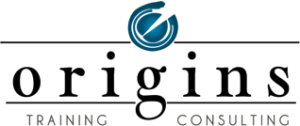
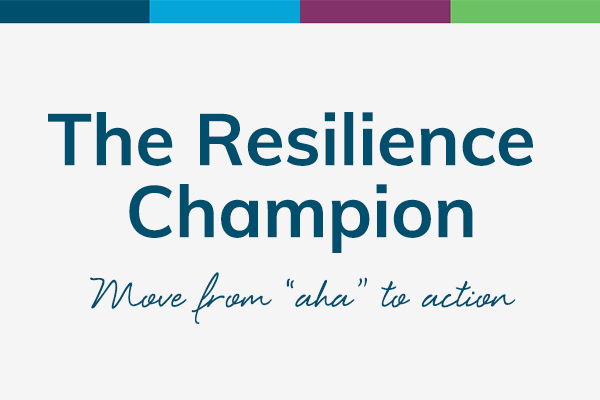
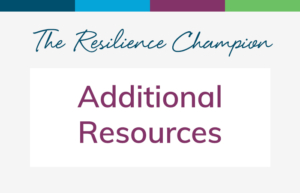
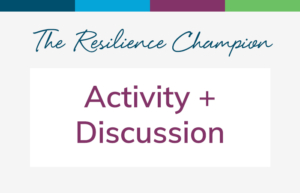
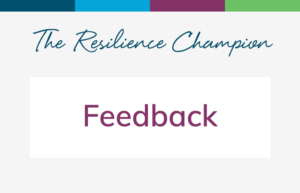
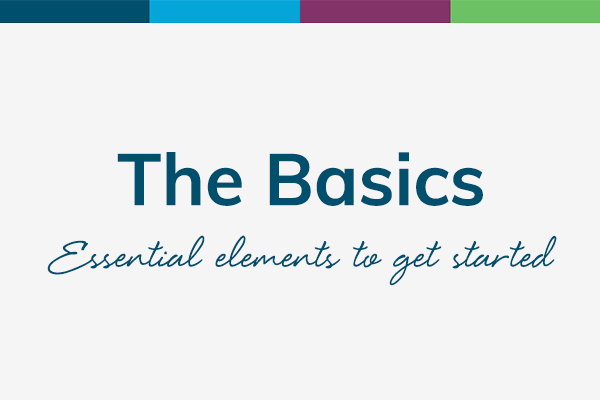


 Getting Started: A Guide from Trauma to Resilience
Getting Started: A Guide from Trauma to Resilience